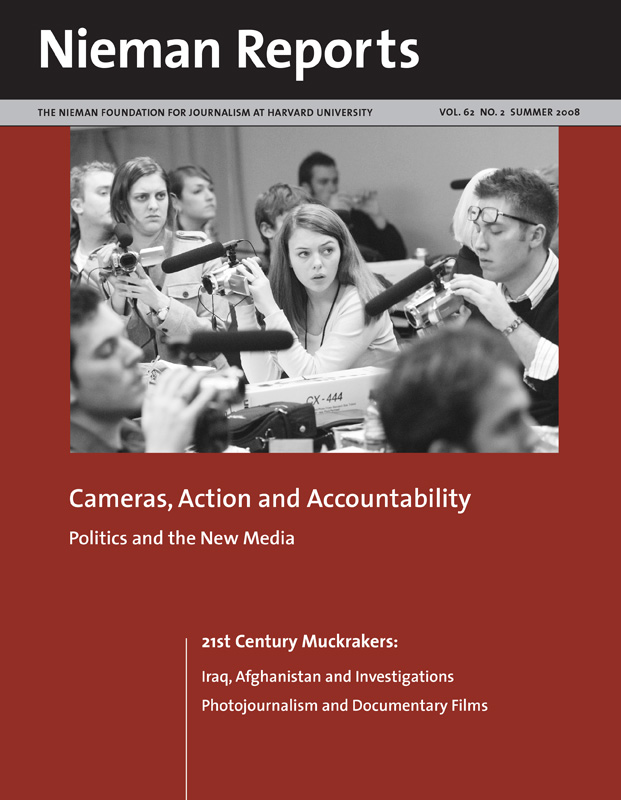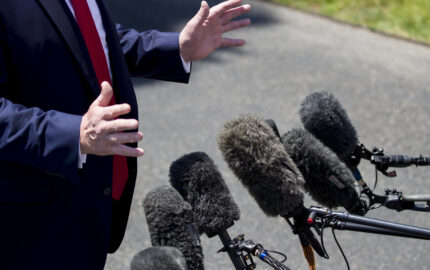If I were cleverer, this piece on Twitter and journalism would fit in Twitter's 140-character limitation. The beauty of Twitter when properly used — by both the reader and the writer — is that everyone knows what it is. No reader expects more from Twitter than it offers, and no one writing tries to shove more than necessary into a Twitter entry, which is sometimes called a Tweet, but not by me, thank you.
Not many people know what Twitter is, though, so I'm going to go on for a few hundred words. Twitter is a Web site that allows you to share your thoughts instantly and on any topic with other people in the Twitter network as long as you do so in tight little entries of 140 characters or less. If you're wondering how much you can write with that space limitation, this sentence that you're reading right now hits that mark perfectly.
For some, journalism is already getting smaller. Newspapers are shrinking. Serious news is being pushed aside in favor of entertainment and fluff stories. To many journalists and guardians of the trade, the idea that any journalist would willingly embrace a smaller space is horrifying and dumb. One journalism professor drew himself up to his full height and denounced Twitter journalism — or microjournalism, as someone unfortunately called it — as the ultimate absurd reduction of journalism. (I think he may have dislodged his monocle, he was waving his quill pen so violently.) Venerable CBS newsman Roger Mudd had a far lighter touch when he joked to me that he could barely say the word "texting" when he and I were talking about the idea of delivering a couple of sentences and calling it journalism.
We can all agree that journalism shouldn't get any smaller, but Twitter doesn't threaten the traditions of our craft. It adds, rather than subtracts, from what we do.
As I spend nearly all of my time on the road these days reporting on the presidential campaigns, Twitter is the perfect place for all of those asides I've scribbled in the hundreds of notebooks I have in my garage from the campaigns and stories I've covered over the years. Inside each of those notebooks are little pieces of color I've picked up along the way. Sometimes these snippets are too off-topic or too inconsequential to work into a story. Sometimes they are the little notions or sideways thoughts that become the lede of a piece or the kicker. All of them now have found a home on Twitter.
As journalists we take people places they can't go. Twitter offers a little snapshot way to do this. It's informal and approachable and great for conveying a little moment from an event. Here's an entry from a McCain rally during the Republican primaries: "Weare, NH: Audience man to McCain: 'I heard that Hershey is moving plants to Mexico and I'll be damned if I'm going to eat Mexican chocolate.'" In Scranton covering Barack Obama I sent this: "Obama: 'What's John McCain's problem?' Audience member: 'He's too old' Obama: 'No, no that's not the problem. There are a lot of wise people ….'" With so many Democrats making an issue of McCain's age, here was the candidate in the moment seeming to suggest that critique was unfair.
Occasionally, just occasionally, reporters can convey a piece of news that fits into 140 characters without context. If Twitter had been around when the planes hit the World Trade Center, it would have been a perfect way for any one who witnessed it to convey at that moment what they'd seen or heard. With Twitter, we can also pull back the curtain on our lives a little and show readers what it's like to cover a campaign. ("Wanna be a reporter? On long bus rides learn to sleep in your own hand.")
The risk for journalism, of course, is that people spend all day Twittering and reading other people's Twitter entries and don't engage with the news in any other way. This seems a pretty small worry. If written the right way, Twitter entries build a community of readers who find their way to longer articles because they are lured by these moment-by-moment observations. As a reader, I've found that I'm exposed to a wider variety of news because I read articles suggested to me by the wide variety of people I follow on Twitter. I'm also exposed to some keen political observers and sharp writers who have never practiced journalism.
Twitter is not the next great thing in journalism. No one should try to make Twitter do more than it can and no reader should expect too much from a 140-character entry. As for the critics, their worries about Twitter and journalism seem like the kind of obtuse behavior that would make a perfect observational Twitter entry: "A man at the front of the restaurant is screaming at a waiter and gesticulating wildly. The snacks on the bar aren't a four-course meal!"
John Dickerson is chief political correspondent for Slate.
Not many people know what Twitter is, though, so I'm going to go on for a few hundred words. Twitter is a Web site that allows you to share your thoughts instantly and on any topic with other people in the Twitter network as long as you do so in tight little entries of 140 characters or less. If you're wondering how much you can write with that space limitation, this sentence that you're reading right now hits that mark perfectly.
For some, journalism is already getting smaller. Newspapers are shrinking. Serious news is being pushed aside in favor of entertainment and fluff stories. To many journalists and guardians of the trade, the idea that any journalist would willingly embrace a smaller space is horrifying and dumb. One journalism professor drew himself up to his full height and denounced Twitter journalism — or microjournalism, as someone unfortunately called it — as the ultimate absurd reduction of journalism. (I think he may have dislodged his monocle, he was waving his quill pen so violently.) Venerable CBS newsman Roger Mudd had a far lighter touch when he joked to me that he could barely say the word "texting" when he and I were talking about the idea of delivering a couple of sentences and calling it journalism.
We can all agree that journalism shouldn't get any smaller, but Twitter doesn't threaten the traditions of our craft. It adds, rather than subtracts, from what we do.
As I spend nearly all of my time on the road these days reporting on the presidential campaigns, Twitter is the perfect place for all of those asides I've scribbled in the hundreds of notebooks I have in my garage from the campaigns and stories I've covered over the years. Inside each of those notebooks are little pieces of color I've picked up along the way. Sometimes these snippets are too off-topic or too inconsequential to work into a story. Sometimes they are the little notions or sideways thoughts that become the lede of a piece or the kicker. All of them now have found a home on Twitter.
As journalists we take people places they can't go. Twitter offers a little snapshot way to do this. It's informal and approachable and great for conveying a little moment from an event. Here's an entry from a McCain rally during the Republican primaries: "Weare, NH: Audience man to McCain: 'I heard that Hershey is moving plants to Mexico and I'll be damned if I'm going to eat Mexican chocolate.'" In Scranton covering Barack Obama I sent this: "Obama: 'What's John McCain's problem?' Audience member: 'He's too old' Obama: 'No, no that's not the problem. There are a lot of wise people ….'" With so many Democrats making an issue of McCain's age, here was the candidate in the moment seeming to suggest that critique was unfair.
Occasionally, just occasionally, reporters can convey a piece of news that fits into 140 characters without context. If Twitter had been around when the planes hit the World Trade Center, it would have been a perfect way for any one who witnessed it to convey at that moment what they'd seen or heard. With Twitter, we can also pull back the curtain on our lives a little and show readers what it's like to cover a campaign. ("Wanna be a reporter? On long bus rides learn to sleep in your own hand.")
The risk for journalism, of course, is that people spend all day Twittering and reading other people's Twitter entries and don't engage with the news in any other way. This seems a pretty small worry. If written the right way, Twitter entries build a community of readers who find their way to longer articles because they are lured by these moment-by-moment observations. As a reader, I've found that I'm exposed to a wider variety of news because I read articles suggested to me by the wide variety of people I follow on Twitter. I'm also exposed to some keen political observers and sharp writers who have never practiced journalism.
Twitter is not the next great thing in journalism. No one should try to make Twitter do more than it can and no reader should expect too much from a 140-character entry. As for the critics, their worries about Twitter and journalism seem like the kind of obtuse behavior that would make a perfect observational Twitter entry: "A man at the front of the restaurant is screaming at a waiter and gesticulating wildly. The snacks on the bar aren't a four-course meal!"
John Dickerson is chief political correspondent for Slate.




